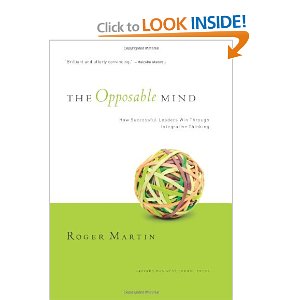After gobbling up Augustine, Julian of Norwich, and a whole host of Germans with names like Ernst and Emil, you left seminary and went about the less than quiet business of leading a congregation, an organization or a school. And it got complicated.
Although Barth’s advice about preaching with the Bible in one hand and a newspaper in the other seems right, there are probably other ways to (re)ignite your creativity at work and in ministry. Here’s a short list of books (some practical, some literary) to help with that:
“Housekeeping,” by Marilynne Robinson. Yes, “Gilead” won the Pulitzer. Yes, John Ames is a pastor. And yes, nothing sounds better than sitting on the porch with him and old Boughton and disputing the merits of Calvinism. But Robinson’s first novel is an imaginative masterpiece in which art and theology become indistinguishable. If the Christian faith feels a bit stale to you at the moment, it won't after reading this.
“The Opposable Mind,” by Roger Martin. We’re always looking for ways to reduce complexity so it’s more manageable. Unfortunately there’s the tendency to reduce complex challenges into binary, either/or oppositions. Martin provides an interesting “third way” approach that holds divisions in healthy tension with one another -- or holds them “opposably” not oppositionally, as he says. In a cultural (and political) environment such as ours in which polarization rules the day, this is an invaluable book for leading a community or an organization through divisive challenges.
“Change or Die,” by Alan Deutschman. Sometimes things are as simple as this title suggests, and yet incredibly hard to bring about. If you (or your places of work and ministry) feel “stuck” in destructive habits and mindsets, here’s a great book to help you rethink how you approach behavioral and organizational patterns.
“Four Quartets,” by T.S. Eliot. If The Tree of Life’s Christian vision of creation left you wonderstruck, then you’ll find Eliot’s Quartets a poetic counterpoint. A film reviewer called Terrence Malick’s film a “prayer.” Think of Eliot’s work as four prayers.
“Pulphead,” by John Jeremiah Sullivan. Literary critic James Wood of “The New Yorker” said this about Sullivan: “He’s a fierce noticer.” True, the stories are fantastic, but as a writer, Sullivan’s greatest strengths are empathy, mindfulness and the ability to see and make connections in the most unlikely of places. Hopefully some of Sullivan’s virtues will rub off on you while reading him.












